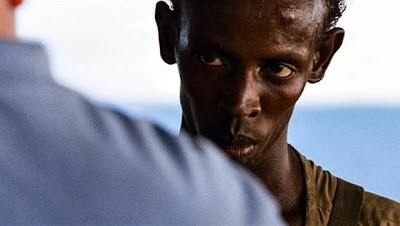Captain Phillips Review
Greater than the sum of its great parts
Full review by Isaac Handelman
The title Captain Phillips is deceiving, as Captain Phillips isn’t really about Captain Phillips at all. He’s the driving force of the narrative, and he’s a dependable presence to root for, but his character is not what makes Captain Phillips a phenomenal film -- which it is, without a shadow of a doubt. Sure, Tom Hanks delivers one of the finest performances of his career. Sure, the film is chock full of nail-biting intensity.
But, at its core, Captain Phillips is about Somalian pirate Muse (Barkhad Abdi). The film takes a while to get going; it spends a significant amount of time showing its two main players, Captain Phillips and Muse, preparing for their respective voyages. Phillips can best be described as a slow boil; the opening section of the film can be grating and somewhat uninteresting, but by the film’s close, the slow opening is justified by some truly magnificent payoff. Once Captain Phillips gets going, it stays relatively intense even in its mellowest scenes, and tremendously nerve-wracking at its anxiety-inducing peaks. Phillips and Muse face off across various mind games, bluffs, and threats, and the chemistry between Hanks and newcomer Abdi is strong, with each delivering performances deserving of Oscar nominations, at the very least.
 |
| Captain Phillips gets highly intense. |
Director Paul Greengrass and screenwriter Billy Ray could have easily gotten away with stopping right there. If they had, Captain Phillips still would’ve been a mightily entertaining high-seas thriller. Instead, Greengrass and Ray together elevate the proceedings to something that’s far greater than the sum of its parts. As I touched on above, Captain Phillips himself, though enormously likable and terrifically portrayed by Hanks (especially at the gut-wrenching conclusion), Phillips does not undergo any significant transformation over the course of the film.
That honor, in a bizarre twist on the Hollywood norm, goes to the film’s “antagonist,” Muse. Over the course of Captain Phillips, Muse’s feelings towards what he has been reduced to are repeatedly called into question. As the film progresses, the audience gradually shifts from rabid hatred of the pirate captain to a sympathetic understanding of his plight. Muse is a brilliantly complex, tragic character, and Barkhad Abdi bounces effortlessly from downright menacing to heartbreakingly hopeless.
Muse’s predicament is what lends depth to Captain Phillips, and it allows the film to achieve heights astronomical compared to what the film would have under the helm of most filmmakers. The film ultimately has something far-reaching and profound to say about the tragedy and hopelessness of the human condition. In fact, Captain Phillips’ conclusion is one of the most brilliant I have ever seen in cinema, expertly encapsulating everything the film sets out to say over the course of just one or two short minutes. The film delivers one of the most memorable "happy endings" (with an emphasis on the quotes) in recent cinematic memory.
 |
| Abdi manages to match Hanks' killer performance, |
But Captain Phillips isn’t all depressing, and that’s thanks largely to headliner Tom Hanks. Though his character is (arguably) not involved as heavily in the existential statements the film is so keen on making, the film is inarguably focused on Captain Phillips -- and any lesser actor would not have been able to carry the weight. In this role, Hanks is able to flex every muscle in his repertoire at some point over the course of the film’s runtime, before knocking it out of the park in a heart-wrenching yet hopeful final scene. If the tremendous performance given by Hanks throughout the entirety of Captain Phillips wasn’t enough to get him an Oscar nod, then this little bit at the end undoubtedly will be. That final scene is a nice little reminder as to why Tom Hanks is one of Hollywood’s all-time greats.
And so could have been Captain Phillips as a whole, had Greengrass and Ray not been intent on delivering so much more to go along.



Comments
Post a Comment